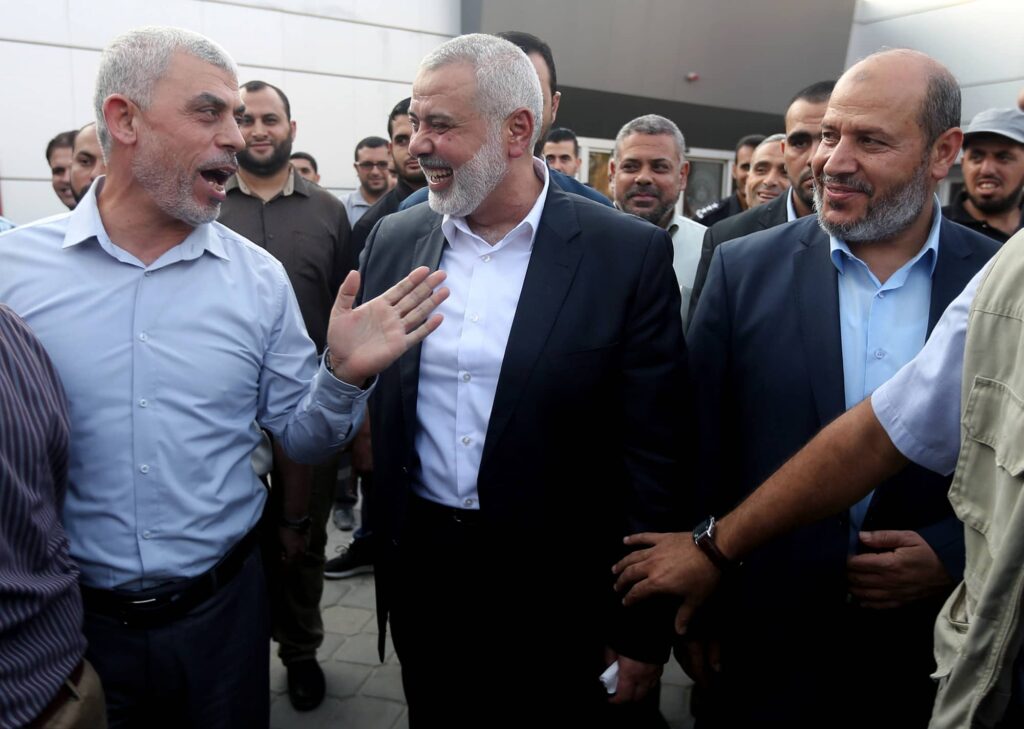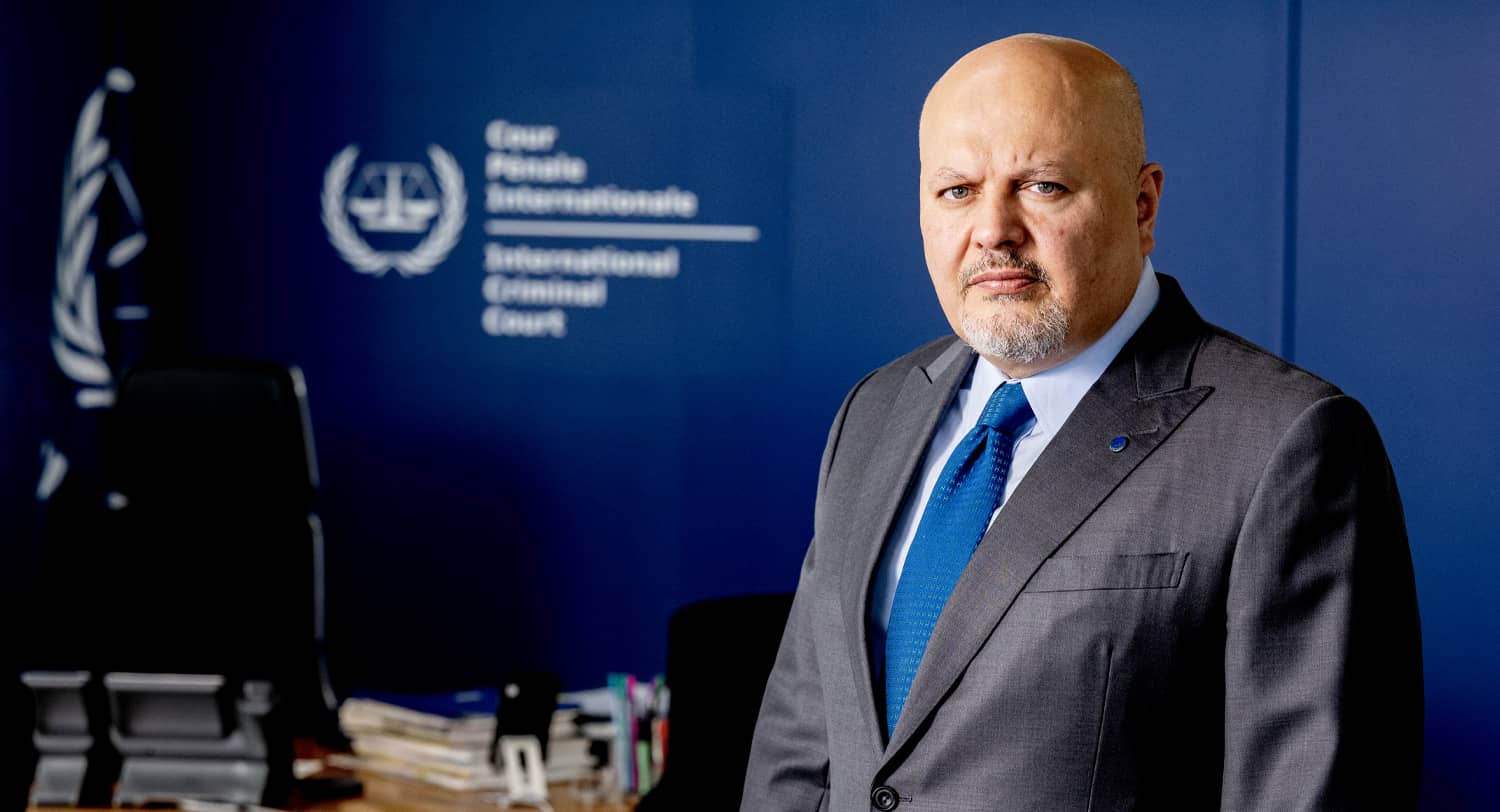On May 20, the chief prosecutor of the International Criminal Court Karim Khan issued a public statement requesting arrest warrants for five individuals. They are Hamas military leaders Yahya Sinwar and Mohammed al-Masri (known as Mohammed Deif or “guest” in Arabic because he frequently changes residences), head of the Hamas political bureau Ismail Haniyeh, and Israel’s Prime Minister Benjamin Netanyahu and Defense Minister Yoav Gallant.
As of late June, the judges of the ICC have issued no arrest warrants in what they call “the situation in Palestine.” On June 25, they did announce additional arrest warrants against Russian officials over the war in Ukraine, so more decisions may be forthcoming from the court. Arrest warrants for its leaders would be very consequential for Hamas.
The ICC prosecutor is prepared to throw the book at Hamas’s three leaders, accusing them of crimes against humanity and war crimes including extermination, murder, taking hostages, rape and other acts of sexual violence, torture, and other inhumane acts. Interestingly, the May 20 prosecutor’s public statement does not mention genocide. The International Criminal Court was set up to prosecute individuals whereas a separate body, the International Court of Justice, decides disputes between governments, including South Africa’s case against Israel under the Genocide Convention.
The international legal system is based on the principle of state sovereignty and state consent. Israel has not joined the ICC as a state party, has not accepted that its citizens are subject to the ICC’s jurisdiction, and is under no international legal obligation to respect ICC arrest warrants or give them any legal weight unless it wants to. Israel is far from an outlier in this respect. Currently, 68 percent of the world’s population lives in countries that are not state parties to the ICC treaty.
Palestine, on the other hand, is a state party to the ICC treaty, having applied for state party status on January 1, 2015, and having been recognized as such by the judges of the ICC retroactively effective June 13, 2014.
This puts Palestine in a bind. If the ICC judges issue an arrest warrant, or even a summons to appear, against Sinwar, Deif, or Haniyeh, Palestine has a legal obligation to arrest them. (Note: “Palestine” – not the “Palestinian Authority” – has the legal obligation. In other words, if the Palestinian Authority were to be replaced, the ICC treaty obligations would continue.) For state parties, there are no exceptions or qualifications to that obligation. Another country’s failure to honor an ICC arrest warrant does not excuse a state party’s requirement to comply with one.
Legal Options
There are several ways Palestine might try to legally duck an ICC arrest warrant. One that would not work would be to withdraw from the ICC treaty, as Kenya did in 2013. A withdrawal is not effective for one year after the state party notifies the ICC, and in that year, Palestine would still have the obligation to carry out ICC arrest warrants. More importantly, the treaty imposes a continuing obligation to carry out ICC arrest warrants.
Moreover, Palestine’s withdrawal would also weaken the jurisdictional basis for the ICC’s taking up the case, which requires a nexus to the territory of a state party, though the judges are likely to rule that they have jurisdiction because Palestine was a state party at the time of Hamas’s terrorist attack on October 7 and throughout the subsequent fighting between Israel and Hamas.
Another option for Palestine would be to conduct its own criminal investigation and prosecution against the Hamas leaders. As the ICC prosecutor said on May 20, the principle of complementarity “requires a deferral to national authorities only when they engage in independent and impartial judicial processes that do not shield suspects and are not a sham.” Given Hamas’s control of the judicial system in Gaza, a serious investigation in Gaza seems unlikely unless Hamas is removed from power in Gaza. Investigations and prosecution against Hamas officials would take serious determination by the Palestinian Authority leadership, and while this should not be ruled out, it seems highly improbable.
There are, admittedly, no direct sanctions or punishments that the ICC can impose for Palestine failing to comply with ICC arrest warrants. South Africa ignored the ICC arrest warrant for Sudanese president Omar Hassan al-Bashir when he visited South Africa in 2015. The ICC Assembly of State Parties could in theory take action, but that seems unlikely given its lack of action in other cases.
If the ICC issues an arrest warrant for Haniyeh, who lives in Qatar, Palestine would be obligated by the ICC treaty to seek his return to Palestine so he can be transferred to The Hague. The cases of Sinwar and Deif, who live in Gaza, pose a different legal challenge. The Palestinian Authority could say it does not have control in Gaza and is unable to arrest them. But Palestinian officials would be in a difficult position to try to explain whether Gaza is in rebellion against Palestine, or a breakaway province claiming de facto independence, or something else.

Political consequences
One political consequence of ICC arrests warrants would be to strengthen the hand of Palestinians who want to keep out Hamas, or at least Hamas’s top leaders, from any future role in Palestinian political life. Sinwar and other Hamas leaders launched October 7 for the purpose of trying to replace Fatah as the leader of the Palestinian movement.
Thus, ICC arrest warrants would push back against the Hamas plan. It would also seriously complicate the calls of a number of Palestinian leaders, including former prime minister Salam Fayyad, to unite Fatah, Hamas, and other groups under the umbrella of the Palestine Liberation Organization. Excluding war criminals from leadership would seem to be a necessary and useful step for Palestinian leaders seeking to build international support.
Another consequence, if Palestine fails to arrest Sinwar, Deif, and Haniyeh, would be to strengthen the hands of those in Israel—both officials and the public—who question whether Palestine would live up to any agreement with Israel or anyone else. Failure of Palestine to live up to its commitment to the ICC would become a lead weight around the neck of any future Palestinian effort to negotiate agreements with Israel.
Many Israelis already point with skepticism at such Palestinian programs as payments to those killed in attacks against Israel (“martyr payments” in Palestine; “pay for slay” to Israelis). But any progress towards a lasting reconciliation between Palestinians and Israelis will require trust that both sides would live up to commitments made as part of a peace agreement or even a temporary ceasefire. Palestinian failure to honor ICC arrest warrants would strengthen such skepticism.
A Positive Option for Palestinians
If Palestinian leaders decide to use the ICC arrest warrants as positive leverage, instead of running away from them, those leaders could try to separate Hamas’s supporters from the three Hamas leaders. This would be analogous to what the Bosnian Serbs did when they eventually excluded Radovan Karadžić and Ratko Mladić from positions of power in post-Dayton Bosnia. Just as the purge of senior war criminals from Bosnian Serb life led to an imperfect peace in Bosnia, the exclusion of only a few most senior Hamas leaders would not likely lead Hamas to renounce its goal of the elimination of the State of Israel, nor would it lead to greater Israeli support for a two-state solution. At best, removal of those Hamas leaders subject to an ICC arrest warrant would be a first step towards long-term changes within the Palestinian movement that will be necessary before there can be peace.
There is much more to be said, legally and politically, about the merits and demerits of ICC engagement in the Gaza war. One truth remains: Israel is not a party to the ICC treaty and is within its legal rights to ignore an ICC arrest warrant directed at its leaders, whereas Palestine is required to comply with ICC arrest warrants. Why this fundamental distinction seems to have escaped most international media commentators reveals more about their biases and prejudices than it does about international justice.
More international attention needs to be focused on the possible ICC arrest warrants against Sinwar, Deif, and Haniyeh. It will have consequences—and it should.

